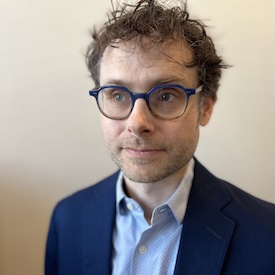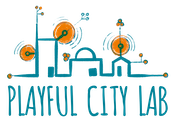(Additional projects are listed on the The Playful City Lab site.)
 Neighborhood Storytelling System (lead designer, 2018-2021). This project investigates how physical objects — including our custom Humanities Truck — can connect as a “storytelling system” for neighborhoods, including to bring museum content to the streets and public libraries. We feature stories from the Smithsonian Anacostia Community Museum (ACM), and its anniversary exhibition, “A Right to The City.” We connect the truck to residents’ cell phones, playful paper maps, and even custom phone booths to record new stories. We are showing how cities can tell their own stories by connecting digital platforms to public space — a new kind of infrastructure for civic storytelling.
Neighborhood Storytelling System (lead designer, 2018-2021). This project investigates how physical objects — including our custom Humanities Truck — can connect as a “storytelling system” for neighborhoods, including to bring museum content to the streets and public libraries. We feature stories from the Smithsonian Anacostia Community Museum (ACM), and its anniversary exhibition, “A Right to The City.” We connect the truck to residents’ cell phones, playful paper maps, and even custom phone booths to record new stories. We are showing how cities can tell their own stories by connecting digital platforms to public space — a new kind of infrastructure for civic storytelling.
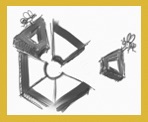 Authoring tool: Hive Mechanic is a new way to create your own city game, smart city activity, or participatory neighborhood story. Tap into city data, send text messages, or use RFID to bring physical objects to life. Now supported by a major grant from IMLS. No programming required — just use our card system. Our goal is to help democratize design, from library maker spaces to community museums. Currently in early beta, contact us if you would like to help!
Authoring tool: Hive Mechanic is a new way to create your own city game, smart city activity, or participatory neighborhood story. Tap into city data, send text messages, or use RFID to bring physical objects to life. Now supported by a major grant from IMLS. No programming required — just use our card system. Our goal is to help democratize design, from library maker spaces to community museums. Currently in early beta, contact us if you would like to help!
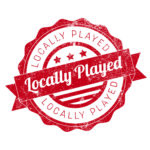 Locally Played Stickers: a campaign for anyone to use, inspired by the success of locally made goods. By calling a game “locally played,” we recognize and elevate a particular spirit of play—including hopes of greater connection to place, our neighbors, and our local history.
Locally Played Stickers: a campaign for anyone to use, inspired by the success of locally made goods. By calling a game “locally played,” we recognize and elevate a particular spirit of play—including hopes of greater connection to place, our neighbors, and our local history.
 Sankofa Says (lead designer, 2014) is an urban game to meet neighbors and discover local history. Teams competed to draw a crowd at local monuments, answering trivia questions and acting out city myths. Playing involves a rebuilt payphone, paper maps, the city historian and cellphone photography. The game was an official selection of the IndieCade Festival of independent games. For more, see the game website from our design collective, the Leimert Phone Company.
Sankofa Says (lead designer, 2014) is an urban game to meet neighbors and discover local history. Teams competed to draw a crowd at local monuments, answering trivia questions and acting out city myths. Playing involves a rebuilt payphone, paper maps, the city historian and cellphone photography. The game was an official selection of the IndieCade Festival of independent games. For more, see the game website from our design collective, the Leimert Phone Company.
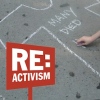 Re:Activism Atlanta (August, 2013). I helped adapt this civic activist game to Atlanta, and incorporated Vojo — a grassroots tool for activist reporting. “Come race through the streets and the past of Atlanta as you work with your team to complete challenges that reveal the hidden history of activism and civil rights in the city! Re:Activism Atlanta is a location-based urban game that maps the history of activism onto the streets where it happened. Players reenact and re-create the actions that once took place in sites such as Piedmont Park, City Hall, and secret underground spots in the heart of downtown. Discover the drama of events from over 100 years ago through playful reenactment and never look at the city in the same way again.”
Re:Activism Atlanta (August, 2013). I helped adapt this civic activist game to Atlanta, and incorporated Vojo — a grassroots tool for activist reporting. “Come race through the streets and the past of Atlanta as you work with your team to complete challenges that reveal the hidden history of activism and civil rights in the city! Re:Activism Atlanta is a location-based urban game that maps the history of activism onto the streets where it happened. Players reenact and re-create the actions that once took place in sites such as Piedmont Park, City Hall, and secret underground spots in the heart of downtown. Discover the drama of events from over 100 years ago through playful reenactment and never look at the city in the same way again.”
![]() The Leimert Phone Company is a design collaborative that seeks to re-imagine the phonebooth (co-founded in 2013). We are repurposing old payphones for civic engagement on local streets. The project was born from a series of workshops that joined artists from historic Leimert Park with technologists and designers from universities and the neighborhood itself. Follow @LeimertPhoneCo on Twitter. Details at: http://LeimertPhoneCompany.net/
The Leimert Phone Company is a design collaborative that seeks to re-imagine the phonebooth (co-founded in 2013). We are repurposing old payphones for civic engagement on local streets. The project was born from a series of workshops that joined artists from historic Leimert Park with technologists and designers from universities and the neighborhood itself. Follow @LeimertPhoneCo on Twitter. Details at: http://LeimertPhoneCompany.net/
![]() Participatory Mapping with the Ride South LA project (2008-13). “This is a new way to advocate for a better Los Angeles — using ordinary cell phones! We are bringing people together to take pictures, map what matters, and improve our city. Join our community of urban mappers, cell phone storytellers, and everyday photographers.” Check out our two maps: to the Watts Towers, and for Healthy Living on http://RideSouthLA.com.
Participatory Mapping with the Ride South LA project (2008-13). “This is a new way to advocate for a better Los Angeles — using ordinary cell phones! We are bringing people together to take pictures, map what matters, and improve our city. Join our community of urban mappers, cell phone storytellers, and everyday photographers.” Check out our two maps: to the Watts Towers, and for Healthy Living on http://RideSouthLA.com.
 SteetClaims (Co-Founder, 2011). How might educational assessment be democratized and made more meaningful, especially for students? This iPad-based design blends the statistical rigor of Evidence-Centered Design with face-to-face shifts in power. Unlike most educational designs, the inspiration is from civic projects including community-based assessments that empower participants to claim agency over their own learning. Draws on lessons from games about mediating feedback and gathering data as part of player engagement. Funded by the Arizona State University Center for Games and Impact.
SteetClaims (Co-Founder, 2011). How might educational assessment be democratized and made more meaningful, especially for students? This iPad-based design blends the statistical rigor of Evidence-Centered Design with face-to-face shifts in power. Unlike most educational designs, the inspiration is from civic projects including community-based assessments that empower participants to claim agency over their own learning. Draws on lessons from games about mediating feedback and gathering data as part of player engagement. Funded by the Arizona State University Center for Games and Impact.
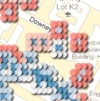 NearByUs. (Co-design and development, with P. Vaniawala). A technical demonstration of a novel approach to collecting group data with mobile phones. Included a native Android application to gather sensor data (GPS, accelerometer, WiFi radio, etc.), coupled with server-side storage and APIs to analyze and report on the data (geoRSS xml). Provides a novel privacy solution that draws on the group-level accountability of local nonprofits in associational life. The premise is that spatial mapping often benefits from a group perspective, and that privacy should similarly be embodied in group-level aggregation and storage techniques.
NearByUs. (Co-design and development, with P. Vaniawala). A technical demonstration of a novel approach to collecting group data with mobile phones. Included a native Android application to gather sensor data (GPS, accelerometer, WiFi radio, etc.), coupled with server-side storage and APIs to analyze and report on the data (geoRSS xml). Provides a novel privacy solution that draws on the group-level accountability of local nonprofits in associational life. The premise is that spatial mapping often benefits from a group perspective, and that privacy should similarly be embodied in group-level aggregation and storage techniques.
 VozMob/Mobile Voices (Participant and Design Researcher, 2009-11). VozMob is a mobile and open-source storytelling platform for low-wage immigrants in Los Angeles. Winner of the United Nations-sponsored World Summit Award for innovative mobile applications. All participants seek to share power in the design process. VozMob amplifies the voices of the excluded by appropriating mobile phones for popular communication. The platform is now available as the Vojo service. http://vozmob.net/en
VozMob/Mobile Voices (Participant and Design Researcher, 2009-11). VozMob is a mobile and open-source storytelling platform for low-wage immigrants in Los Angeles. Winner of the United Nations-sponsored World Summit Award for innovative mobile applications. All participants seek to share power in the design process. VozMob amplifies the voices of the excluded by appropriating mobile phones for popular communication. The platform is now available as the Vojo service. http://vozmob.net/en
![]() Peter Packet Challenge (Lead Designer, 2004). A pioneering civic game with real-world fundraising for middle school students. The prototype was attached to the larger Peter Packet game that reached 150,000 youth; for my portion, participants competed to raise money and fight global poverty, learning about schools in Mexico, India and Zimbabwe. First known example of youth competing in online fundraising. Supported by Cisco Systems. See brief case study. A program of NetAid/Mercy Corps, with support from Cisco Systems.
Peter Packet Challenge (Lead Designer, 2004). A pioneering civic game with real-world fundraising for middle school students. The prototype was attached to the larger Peter Packet game that reached 150,000 youth; for my portion, participants competed to raise money and fight global poverty, learning about schools in Mexico, India and Zimbabwe. First known example of youth competing in online fundraising. Supported by Cisco Systems. See brief case study. A program of NetAid/Mercy Corps, with support from Cisco Systems.
 Global Citizen Corps Online (Lead Designer, 2005). An online learning community for training high school activists in the fight on extreme poverty. Complemented the face-to-face training of participants, helping them to reach 150,000 of their peers over two years. A Program of NetAid/Mercy Corps.
Global Citizen Corps Online (Lead Designer, 2005). An online learning community for training high school activists in the fight on extreme poverty. Complemented the face-to-face training of participants, helping them to reach 150,000 of their peers over two years. A Program of NetAid/Mercy Corps.
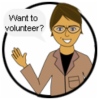 VolunteerGuru (Lead Designer, 2003). An artificial guidance counselor for international volunteers in the fight on global poverty. Ran as a service of the NetAid Foundation for several years, reaching tens of thousands of users with personalized volunteering advice.
VolunteerGuru (Lead Designer, 2003). An artificial guidance counselor for international volunteers in the fight on global poverty. Ran as a service of the NetAid Foundation for several years, reaching tens of thousands of users with personalized volunteering advice.
